
It is very challenging to attract those who really need and value law firms within this competitive space of law firms. Gathering high-quality leads rather than a good number of leads should be the focus because if converted, they are long-term clients. High-quality leads are people or businesses looking for legal help that includes clear intent to hire them, thus making them more valuable for law firms. The effective generation of leads can make it possible for a firm to stand out, increase credibility, and eventually build a stronger client base.
The scope of discussion would include how the firms should utilize strategies so as to attract and nourish top-quality leads. Ranging from optimizing a firm’s online presence to applying digital marketing techniques specifically targeted for legal services, it will provide steps towards making easy visibility, trust creation, and conversion possible. Through this approach, focusing on such methods, law firms can strive to make a difference and be able to associate with clients who considerably need their services.
Understanding High-Quality Leads for Law Firms

A good-quality lead from the legal standpoint is a prospect who may be said to have an immediate intent to hire the services of lawyers, hence giving them a better chance of being converted into a paying client. Good quality leads, therefore, are not casual inquiries but persons or businesses seeking legal services at a point in time when they require such services. Leads in such cases are usually driven by urgency-for instance, needing representation in a pending lawsuit or a need for immediate assistance in legal documentation.
Ideal legal clients also share an affinity for the firm’s niche practice areas. That translates to a family law firm that considers leads tied to a divorce, custody fight, or adoption superior to any other general legal question. Final consideration: intent to hire quality leads indicates a degree of commitment, such as looking for specific information on services provided, inquiring about costs, or stating exactly when they will need a lawyer. Such identification will help the law firm focus on those leads that carry the highest potential for conversion, therefore directing resources and efforts toward maximum effect.
Building a Strong Online Presence
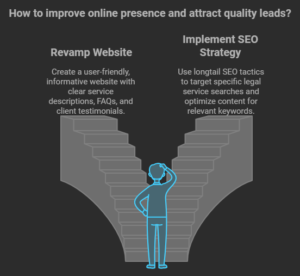
A law firm’s website is the ideal base from which to start creating a solid online presence, in aiding the attraction of quality leads. A well-done website will ensure clear, relevant information regarding the services that the firm provides, who the firm is, and the areas in which it specializes. A well-executed FAQ section, descriptions of the services with specifics, and testimonials from happy clients can help establish trust also and make the site more informative to potential clients.
On top of these advantages of SEO is visibility, which, in turn, allows the organization to be present in search results. Longtail SEO tactics would be the best, such as “divorce lawyer in [location]” or “corporate attorney near me”; such keywords can target users who have enough time to spend their effort searching for legal services. Optimization of content for these terms with a mix of new blogs or articles presented every now and then will have some rankings and organic traffic.
Most of them would prefer law firms with legal aid nearby. By claiming the Google My Business profile and other listings in the legal directories, the firm will start appearing in local search results, which should boost its reputation and accessibility to prospective clients.
Content Marketing for Legal Expertise
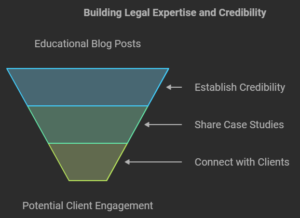
Content marketing is one of the best ways for law firms to establish their credibility and reveal their expertise as the most trusted authority in their respective fields. Perhaps one of the best ways to start using blogs is by incorporating postings on educational topics that help cover common legal questions and topics frequently sought by clients, such as “What to Expect in a Divorce Process” or “How to Choose a Business Lawyer.” This form of content not only touches on pressing questions but also helps in establishing the expertise of the firm, thus giving readers a reason to believe.
Sharing anonymized case studies and success stories provides further proof of the capabilities of a firm. Real outcomes in case studies help potential clients connect the kind of service that the firm will be offering to them with examples successfully handled by the firm when faced with similar cases.
In this regard, video content can have a huge impact and also help connect the firm with its clients on a more personal level. Gone are the lengthy explanations about legal procedures, presentation of team members, and answering those very common questions; short videos help make difficult topics so much more understandable, thereby building rapport, which makes the prospective client feel at ease and well-informed.
Leveraging Paid Advertising
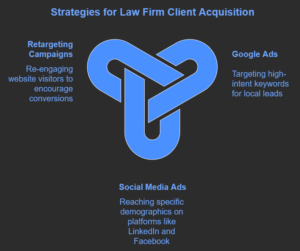
Paid advertising is a very strong opportunity to reach clients who are searching for services. Google Ads allows a law firm to target high-intent keywords like “personal injury lawyer [location]” or “estate planning attorney near me.” Nicheing around geo-based terms could lead law firms to potential leads who would require instant services from a practitioner in their area.
For instance, LinkedIn and Facebook ads enable companies to increase their reach to specific demographics or interests. For example, a family law firm could target advertisements toward people in the relevant age groups or life cycle stage of being recent divorcees or parents.
Retargeting campaigns provide another level of reaching users who have visited the firm’s website and did not convert. You show ads to these users on and off around the web or on social media, keeping them top of mind, hopefully nudging them to return and take action when they are ready to commit.
Building Trust with Client Reviews and Testimonials
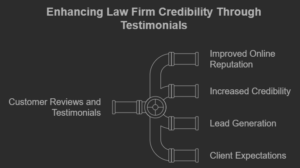
In building trust for a law firm, customer reviews and testimonials play a key role in being able to keep that trust with potential clients. Using this traffic can significantly improve the online reputation of the firm and make it easier for prospects to determine the firm’s credibility. These reviews can be accessed by potential clients even before they reach out to this company; hence, a consistent stream of excellent feedback can work well on lead generation.
Positive success testimonials on the firm’s website, landing pages, and marketing continue to boost its credibility. With the inclusion of testimonials that articulate successes and the experience of clients, firms illustrate their expertise in delivering expertise and satisfaction to their clients. The use of real stories along with authentic feedback from the clients will make the potential clients aware of the degree of service they can expect to receive, thus raising their opportunity to contact the firm having confidence in the capability of doing the job.
Email Marketing to Nurture Leads
Email marketing is one very effective way law firms can nourish leads by building on a relationship and also letting them know what you’re doing to help them. In other words, by generating leads through incentives such as free consultation case assessment or even a downloadable legal guide, your potential client has to share his contact information for seeking free consultations. Right away, these give lead value, and the probability of the client following through with the firm increases.
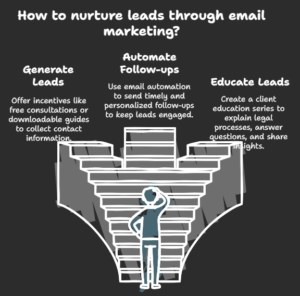
Email automation allows personal follow-ups with leads so as to keep oneself relevant and timely in the flow of conversation. The various inquiries that culminate into real value propositions might remind leads of what the firm is offering by supporting them with helpful information that aids in constructing trust.
Another great use of a client education series is to warm leads over time. Being able to explain applicable legal processes, answer typical questions, or share insight into law matters through those emails can help establish the firm as knowledgeable and supportive. This keeps them at the top of the leads’ minds and increases the chances that the leads will select their services when they need it.
Networking and Partnerships
The building of strategic partnerships and networking, instead of acting as a deterrent to leads from law firms, will also provide opportunities for more leads. Most such partnerships involve doing business with companies whose work complements the practice areas of law firms, such as property law firms teamed with real estate agents or estate planners partnered with financial advisors, which can open up potential referral leads.
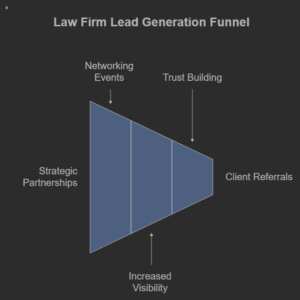
In this manner, law firms have an ongoing stream of client referrals through partners requiring legal services in practice areas. It is, therefore, attendance to local events, seminars on the law, and industry-specific webinars that expand a law firm’s network. Since law firms are able to directly present themselves to prospective clients or other professionals who may refer clients in need of their legal services, active participation boosts visibility and lends a quality of trust within the community, as clients tend to take more heed of recommendations by trusted sources.
In that regard, partnerships and networking expand the reach of a law firm and enable it to connect with qualified leads that would otherwise not consider its services.
Conclusion
Using online strength presence, targeted content marketing, paid advertising, and networking will inspire the firm to attract top-quality leads. These strategies create credibility, trust, and potential visibility in order to position the role as a go-to resource in administering legal assistance.
Experimenting with and trying all sorts of approaches to SEO to the education of clients and partnerships helps identify what works best for the target audience of the firm. By continually refining such strategies, law firms can continue growing and establishing loyal client bases.
